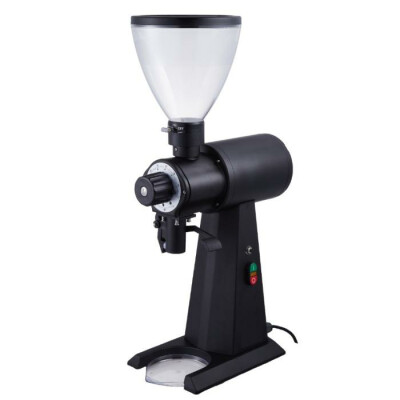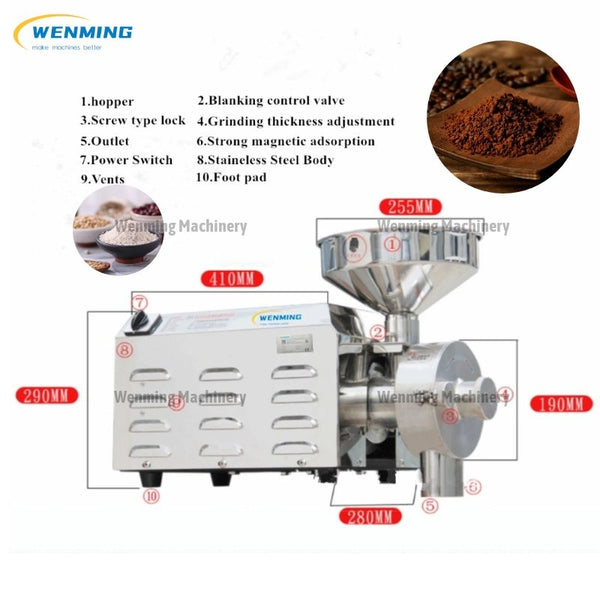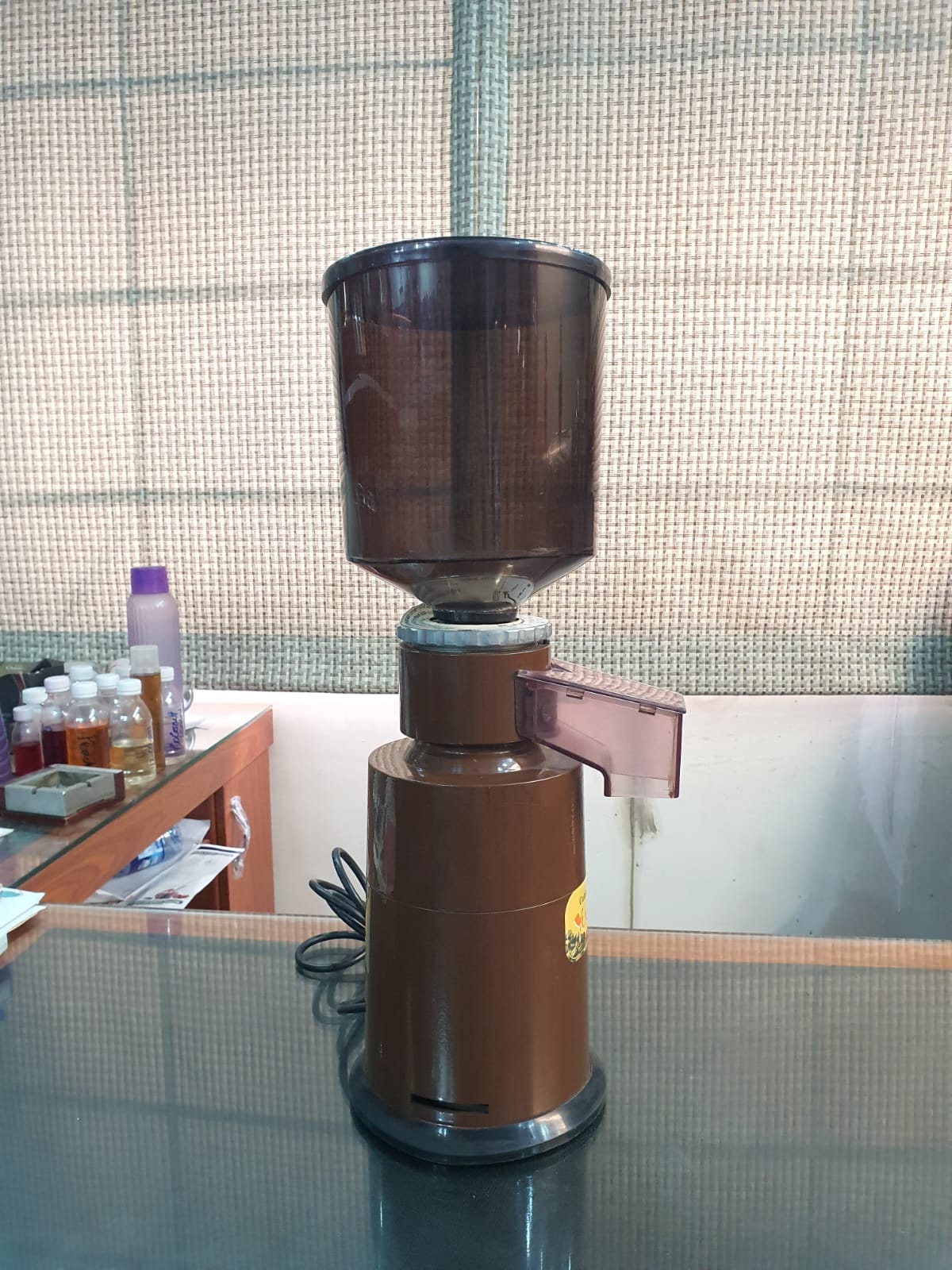Industrial Coffee Grinder vs. Home Grinder: Key Differences Detailed
Industrial Coffee Grinder vs. Home Grinder: Key Differences Detailed
Blog Article
Top Functions to Look for in an Industrial Coffee Mill
When evaluating a commercial coffee mill, it is crucial to identify vital features that impact both efficiency and durability. Uniformity in work size is crucial for ideal removal, while adjustable grinding rate permits for a balance between effectiveness and quality.
Grind Size Uniformity
While numerous factors can influence the top quality of brewed coffee, grind dimension uniformity remains extremely important in accomplishing optimum extraction. The harmony of coffee grounds straight influences the developing procedure, as uneven bit dimensions can cause over-extraction or under-extraction. This disparity leads to unbalanced tastes, where certain notes may be subduing while others are silenced.
Industrial coffee mills are created to supply a high degree of accuracy, usually utilizing burr grinding systems to make certain a consistent work size. Unlike blade mills, which can develop a mix of fine and rugged fragments, burr mills squash the beans between two surfaces, enabling much better control over work dimension. This uniformity is crucial throughout various developing approaches, whether coffee, French press, or pour-over, as each method requires specific grind sizes for ideal flavor extraction.
Furthermore, consistency in grind dimension adds to the overall efficiency of the brewing procedure. A consistent work enables also water flow, reducing the danger of improving and channeling extraction efficiency. In summary, spending in an industrial coffee mill with a concentrate on work dimension uniformity is necessary for attaining high-grade coffee with preferable taste profiles.
Grinding Rate
Grinding rate plays an important function in the general performance of commercial coffee mills, directly affecting both the quality of the work and the effectiveness of the procedure. Industrial Coffee Grinder. Higher grinding rates can dramatically improve the throughput, making it possible to refine larger amounts of coffee beans in a much shorter time structure. This is specifically important for businesses that depend on high-volume production, such as coffee roasteries and coffee shops
However, while rate is important, it is equally crucial to balance it with the high quality of the grind. Exceedingly high grinding speeds can produce warmth, which might adversely influence the taste profile of the coffee by causing the beans to lose essential oils and fragrances. As a result, a grinder that uses adjustable speed settings can give optimal adaptability, allowing operators to customize the grinding procedure according to details needs.
Furthermore, the grinding rate needs to correspond to make certain harmony in the work dimension, further adding to the general taste and brewing quality of the coffee. In summary, examining grinding rate is essential for choosing an industrial coffee grinder that satisfies both efficiency and quality needs.
Build Top Quality and Longevity
The performance of an industrial coffee grinder is not exclusively determined by its grinding rate; build quality and longevity are just as important factors that influence lasting efficiency and dependability. A sound grinder will endure the rigors of daily usage, making it a sound investment for any why not check here type of business procedure.

Sturdiness also encompasses the mill's motor and internal devices. Industrial coffee mills ought to be furnished with durable electric motors efficient in sustaining extended operation without overheating. Additionally, robust burrs are necessary, as they straight affect the quality of the work and add to the total long life of the machine.

Simplicity of Use and Upkeep
Constantly focusing on simplicity of usage and maintenance can substantially improve the operational performance of a commercial coffee grinder. User-friendly features such find here as instinctive controls and clear labeling are vital for minimizing downtime and guaranteeing that operators can promptly adapt to the devices. An ergonomic layout, consisting of height-adjustable receptacles and available grinding chambers, permits for comfy operation and facilitates the loading and discharging of coffee beans.
Additionally, convenience of maintenance is essential for lengthening the lifespan of the grinder. Tools with removable components and parts developed for quick cleaning can simplify maintenance tasks, minimizing the time invested on routine maintenance - Industrial Coffee Grinder. Search for mills that include self-cleaning systems or need minimal disassembly, as these functions can conserve useful labor hours
Additionally, clear upkeep timetables and documentation are important. Mills that come with extensive individual handbooks outlining maintenance treatments can aid operators follow finest techniques, ensuring consistent efficiency and top quality. By purchasing a commercial coffee mill that highlights simplicity of usage and upkeep, organizations can boost productivity, decrease operational costs, and keep the high standards expected in coffee production.


Noise Level Reduction
When choosing a commercial coffee mill, sound degree reduction is a crucial factor that can significantly affect the work environment. High noise levels can lead to employee exhaustion, reduced concentration, and potential hearing damages with time, making it essential to choose a grinder designed with sound-dampening features.
Try to find mills that include sophisticated noise-reduction innovations, such as sound-insulated housings and vibration-dampening installs. These attributes assist to decrease functional audios, producing a quieter ambience conducive to productivity. Industrial Coffee Grinder. Furthermore, selecting grinders equipped with low-noise motors can further enhance sound reduction, guaranteeing a more enjoyable working environment
Think about the grinder's overall design. The placement of the grinder within the office need to be strategic.
Inevitably, buying a coffee grinder that focuses on sound decrease not only improves the comfort of staff members however also straightens with a dedication to preserving a safe and effective work atmosphere. This interest to information can cause boosted worker satisfaction and retention.
Conclusion
In recap, picking a commercial coffee mill requires careful factor to consider of several key features. Grind size consistency is crucial for optimal extraction, while flexible grinding rate helps with an equilibrium in between throughput and quality.
Industrial coffee mills are developed to supply a high level of precision, typically employing burr grinding systems to make certain a consistent work size. Unlike blade mills, which can produce a mix of fine and coarse bits, burr grinders squash the beans between two surfaces, permitting for better control over grind dimension. In summary, investing in a commercial coffee mill with an emphasis on grind size consistency is vital useful content for attaining top quality coffee with desirable flavor profiles.
Grinding speed plays an essential function in the total performance of industrial coffee grinders, straight impacting both the quality of the grind and the efficiency of the procedure. A mill that provides adjustable rate settings can supply ideal versatility, enabling drivers to tailor the grinding process according to details needs.
Report this page